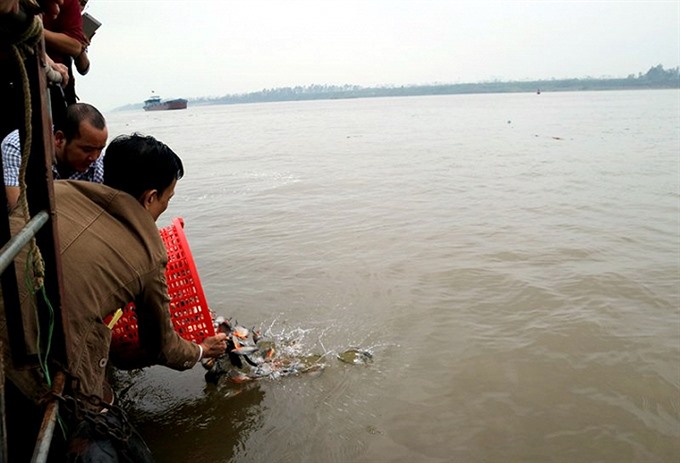 Society
Society

Experts have expressed alarm over the nation’s poor management of invasive and harmful alien species after two cases were widely reported by the media this month.
 |
| A number of red-bellied pacu (Piaractus brachypomus), a close relative of the piranhas, were allegedly released into the Hồng (Red) River in Hà Nội on February 05, raising safety concerns and fears of environmental damage.Photo Vietnamnet.vn |
HÀ NỘI — Experts have expressed alarm over the nation’s poor management of invasive and harmful alien species after two cases were widely reported by the media this month.
The first case is of a company in the Mekong Delta Province of Đồng Tháp illegally raising 120 crayfish (Procambarus clarkia) late last December although the Ministry of Rural Agricultural and Development has banned this for years because they are thought to damage crops.
However, the local authorities found and destroyed the crayfish recently, the Nông thôn ngày nay (Countryside Today) newspaper reported earlier this month.
In the second case, a number of red-bellied pacu (Piaractus brachypomus), a close relative of the piranhas, were allegedly released into the Hồng (Red) River in Hà Nội on February 05, raising safety concerns and fears of environmental damage.
The Ministry of Natural Resources and Environment, one of the two agencies assigned to manage issues related to invasive alien species, has asked the Ministry of Public Security to investigate the case quickly.
Professor Mai Đình Yên, a leading marine scientist and an expert on fish, said overlapping functions of the Ministry of Agriculture and Rural Development and the Ministry of Natural Resources and Environment had been a factor in poor management of invasive alien species.
While the Agriculture Ministry is given the task of permitting an individual or organisation to import alien species, the Environment Ministry is tasked with handling other issues relating to alien species, he said.
Invasive alien species are only permitted to be imported in Việt Nam to serve scientific research purposes.
Yên suggested only one Government agency should manage all issues related to alien species. Other shortcomings could be fixed soon, he said.
In agreement with Yên, Nguyễn Lân Hùng, general secretary of the Việt Nam Union of Biology Associations told Việt Nam Television that overlapping functions was one of the reasons for the current situation.
He said the two ministries should discuss the issue together and find solutions.
The Government should assign a Deputy Prime Minister to make final decisions regarding the management of invasive alien species, he said.
Hùng said every citizen should also be responsible in this regard. They should know well the harmful effects that invasive alien species can have on the country’s environment, he said.
“The illegal raising of crayfish in Đồng Tháp Province is a bitter lesson for managerial agencies,” he said.
"Management of invasive alien species plays an important role in biodiversity protection and agricultural production," he said.
“It is a complicated and costly task, it requires not only authorised agencies but every citizen to join hands to do it,” he said.
In response to the situation, head of the agricultural ministry’s Aquatic Resources Conversation and Development Department, Nguyễn Thị Phương Dung, said management of invasive alien species by the two ministries is clearly regulated.
Dung said the crayfishes illegally bred in Đồng Tháp were imported via unofficial channels, so it would have been really difficult for the agricultural ministry to discover and prevent it.
In this case, the provincial administration also had to take responsibility, because it had also found the crayfish late, she said.
Under item 2, article 43 of the Decree 155/NĐ-CP issued in November, 2016, an individual or organisation can be fined VNĐ5-10 million (US$220-440) for illegally raising, breeding and transporting invasive alien species outside conservation areas for commercial purposes if the activities have yet to cause serious damage. The maximum fine is VNĐ640 million ($28,000).— VNS




